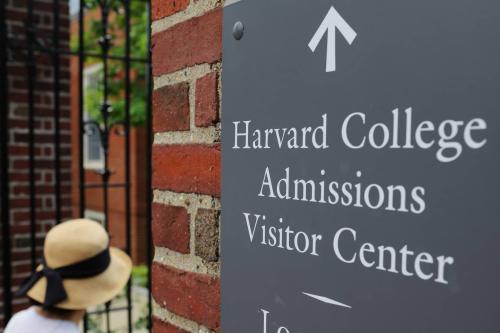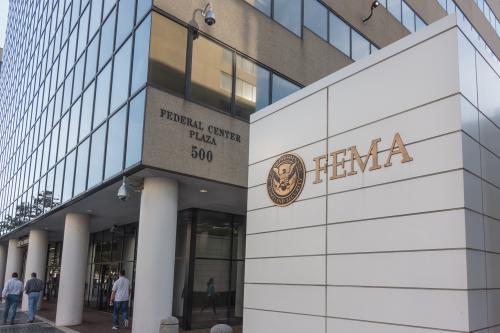

12:30 pm EDT - 1:00 pm EDT
Past Event
12:30 pm - 1:00 pm EDT
1775 Massachusetts Ave., NW
Washington, DC
JPMorgan Chase’s surprise announcement of a multi-billion dollar trading loss stemming from a series of poor investments has renewed calls for tougher Wall Street regulation. While industry advocates have long argued that strict reforms such as Dodd-Frank and the Volcker Rule are unnecessarily burdensome, the loss has brought the issue of financial regulation to the forefront and left many questioning whether stronger laws and further transparency are needed.
Should lawmakers increase their oversight of the nation’s financial system? Would the Volcker Rule have prevented the loss, had it been in force? On May 23, Brookings expert Douglas Elliott answered your questions in a live web chat moderated by Vivyan Tran of POLITICO.
12:30 Vivyan Tran: Welcome everyone, let’s get started.
12:30 [Comment From Brian, DC:]
Can you briefly describe the types of trades that were involved in the Chase controversy?
12:31 Douglas Elliott: There’s a lot we don’t know, but here are the outlines as I understand them now. The original trades were put on to protect Morgan against potential losses if the Euro Crisis really blew up. So they bought protection through credit default swaps (essentially financial insurance) against the possibility of a number of companies going broke. Later, they decided they didn’t need to be quite as well protected, so they took some offsetting positions. However, they decided to do it by trading against an index of credit default swaps, a kind of average like the Dow Jones Industrial Average, except of credit risk. For technical reasons, there are many differences between the exposure they kept and the index they later traded against, which left them with a ton of exposure if the two sets of positions moved differently. This is where their big mistakes were. Sorry, but this could be even more technical.
12:31 [Comment From Anne:]
What does the current situation at JP Morgan Chase say about the overall health of the US banking system?
12:32 Douglas Elliott: The good news is that the $2+ billion blunder says very little about the health of the banking system. Big as $2 billion sounds, it’s very small even in relation to Morgan’s size. It is about one month of pre-tax earnings for the company, around one-hundredth of its net worth, and one-thousandth of the value of its assets. For the banking system as a whole, it’s even smaller.
It could indicate that there are other unsound bets out there of some significant size, but it would take hundreds of them to make any real difference. After all, the industry added about $300 billion of net worth the last few years, providing a lot more margin of error.
12:33 [Comment From Katrina Francis:]
What are the long-term ramifications of the Chase incident? Will Congress now try to clamp down on banks’ trading activities?
12:35 Douglas Elliott: This trading loss unquestionably gives more momentum to those who want the regulations being written to implement the Dodd-Frank Act to be much tougher. The Volcker Rule was on its way to being restricted considerably because of the massive pushback against it and the many practical problems. The tide has been turned as a result of the Morgan loss.
It also gives some momentum to those who want to break up the banks into separate commercial and investment banking firms, although this probably won’t happen.
12:36 [Comment From Aaron E:]
There’s been a lot of discussion as to whether the Volcker Rule would have helped prevent the Chase trading incident. What are your feelings on that and should the Volcker rule be enacted/made stronger?
12:38 Douglas Elliott: It is unclear how the Volcker Rule would have affected the Morgan situation. First, there’s a lot we don’t know about the trades yet. Second, the Volcker Rule as written in the law is extremely ambiguous, one of the problems with it. Therefore, how the regulators write the rules will matter a lot.
12:39 Douglas Elliott: Most likely, the bad trades at the end of the process would have fallen afoul of the Volcker Rule, since they don’t seem to be particularly good hedges or even reversals of the original hedges. However, the original positions might well have passed muster. We just don’t know.
12:41 Douglas Elliott: I am strongly opposed to the Volcker Rule, even though I’m a strong supporter of Dodd-Frank in general. The rule purports to deal with excessive investment risk, but it does this without measuring the risk or measuring the capacity to bear the risk, which is how you tell if a risk is excessive. Instead, it effectively tries to judge the intent of the trade, at least by category of trades. This is bound to fail and it’s not even clear why we would care about the intent, instead of the actual effects on the riskiness of the bank. There are much better ways to handle this.
12:41 [Comment From Gianne:]
Ultimately, what do you think the policy ramifications will be of the trading loss?
12:42 Douglas Elliott: I think the loss will cause the Volcker Rule to be implemented sooner and in a considerably tougher way. I think this is a bad thing, since it will take a misconceived rule and make it more costly to the economy. I also fear that the loss will give momentum to those who want to break up the banks into two pieces, which I believe to be an even worse idea. It might have worked fifty years ago, but it wouldn’t work now.
12:43 [Comment From Joe S:]
Did the provisions in Dodd-Frank go far enough? Is America’s banking system still in need of reform?
12:44 Douglas Elliott: Dodd-Frank is a good law that will make banks considerably safer, and therefore all us safer, once it is fully implemented, which is still years away. There are various things I would have done differently, but it covers the main things that needed to be changed and it requires real, solid actions to reduce risk.
12:44 [Comment From Tim, Maryland:]
I read in your pieces on the Brookings site that you’re a supporter of Dodd-Frank. Since you spent two decades on Wall Street this surprised me. What do you think Dodd-Frank helps to fix?
12:46 Douglas Elliott: The financial crisis showed us that a host of things in our financial system were being done badly, with securitizations, derivatives, rating agencies, mortgages, credit exposures between financial institutions, regulatory structure and powers, etc. Dodd-Frank deals with each of these areas and others and has a pretty good balance between increasing safety and avoiding creating excessive costs.
12:48 Douglas Elliott: The other big changes are complementary to Dodd-Frank, coming out of internationally agreed rules set up by the Basel Committee on Banking Supervision. The rules, known as Basel III, push banks to have much higher net worth than they did before and to make sure their assets are more liquid, in case they needed cash quickly. These are very important safety measures that are being put into place. The banks have already responded to the impending rules by adding $300 billion to their net worth, as I mentioned before.
12:48 [Comment From Eduardo:]
What do you expect the reaction will be to Jamie Dimon when he appears on the Hill? Obviously there will be anger, but it seems as though he has done right for the most part so far by being apologetic and vowing to get to the bottom of the situation.
12:50 Douglas Elliott: He is going to get shellacked! There is tremendous anger and Morgan, my old employer, showed considerable arrogance about its abilities in the way in which it managed these trades and explained them initially when questions were first raised. That said, he is a good person and a brilliant manager, despite these serious mistakes, and he’s going to come out of this with a lot of respect from many people. His apologies do help, but mostly his past actions will be the key to keeping that respect.
12:51 Douglas Elliott: Also, politicians largely do what will get them re-elected. Right now, there are votes in beating up on Jamie Dimon, so I guarantee that’s what you’re going to see.
12:51 [Comment From Will, Los Angeles:]
Compared to other nations like the UK (which has a very robust banking sector in London), how are US regulations? Is the Chase loss a pointed reminder that we need more reform even in the aftermath of the Recession and Dodd-Frank?
12:52 Douglas Elliott: The US banking sector is considerably more robust than the UK at the moment, even with this Morgan blunder. The UK actually had to nationalize several of its major banks and will be holding majority stakes in at least one of the majors for some years still, probably.
12:54 Douglas Elliott: If you think there is a lot of anger against bankers here, you should see the feelings in London, both on the street and in government. So, no I don’t particularly think the UK is pointing us the way here.
As I said earlier, Dodd-Frank will make the financial system much safer, so I don’t see that it has huge holes to be filled in. There are things I would change, but they are generally fairly technical, with a few exceptions, like the Volcker Rule.
12:54 [Comment From Emily B:]
Did Chase act improperly? Or were these just bad investments by a poorly trained employee?
12:55 Douglas Elliott: The short answer is that we don’t know yet. I doubt that anything illegal occurred. There clearly was very bad risk management and some stupid trading decisions, but we might yet find out that something more was going on. Again, though, I doubt it.
12:55 [Comment From Christian:]
How do trades like this get so out of control? Are the larger banks just so big that oversight is lost some times?
12:57 Douglas Elliott: First, there is a sense in which these were not huge trades. If they were trying to protect Morgan against its potential losses on the Euro Crisis, you would expect the positions to be very large because Morgan’s potential loan losses were very large.
It is not clear whether a position of one-tenth its size taken at a bank that was also one-tenth the size would have automatically been any better managed. The main difference is that they would not have made as big a splash when they went wrong.
That said, it probably is harder to manage the very largest firms, which somewhat offsets the other advantages of size.
12:58 [Comment From Bailey:]
Why would breaking up the banks not work in your opinion?
1:00 Douglas Elliott: The difference between loans and securities is now extremely hard to draw, since many loans are written so that they can be, and are, traded. Also, derivatives and securities are a key part of how the bank’s corporate customers manage their borrowings and risks. They want to be able to work with their banks on all parts of their financial decisions, not have to arbitrarily talk about some parts with one firm and other parts with another. Anyway, I could go on at considerable length on this, and probably will in my writings, but the key point is simply that the financial world is far more sophisticated than when Glass-Steagall was created and much of this sophistication is positive.
1:01 Vivyan Tran: Thanks for the questions everyone. See you next week!
12:30 pm - 1:00 pm
On May 23, Douglas Elliott answered your questions on JPMorgan Chase and the regulation of Wall Street during a live web chat moderated by POLITICO.

Nasrin Siddiqa, Atenea Rosado-Viurques
April 23, 2024

Kelli Bird, Ben Castleman
April 23, 2024

Carlos Martín, Carolyn Kousky, Karina French, Manann Donoghoe
April 23, 2024